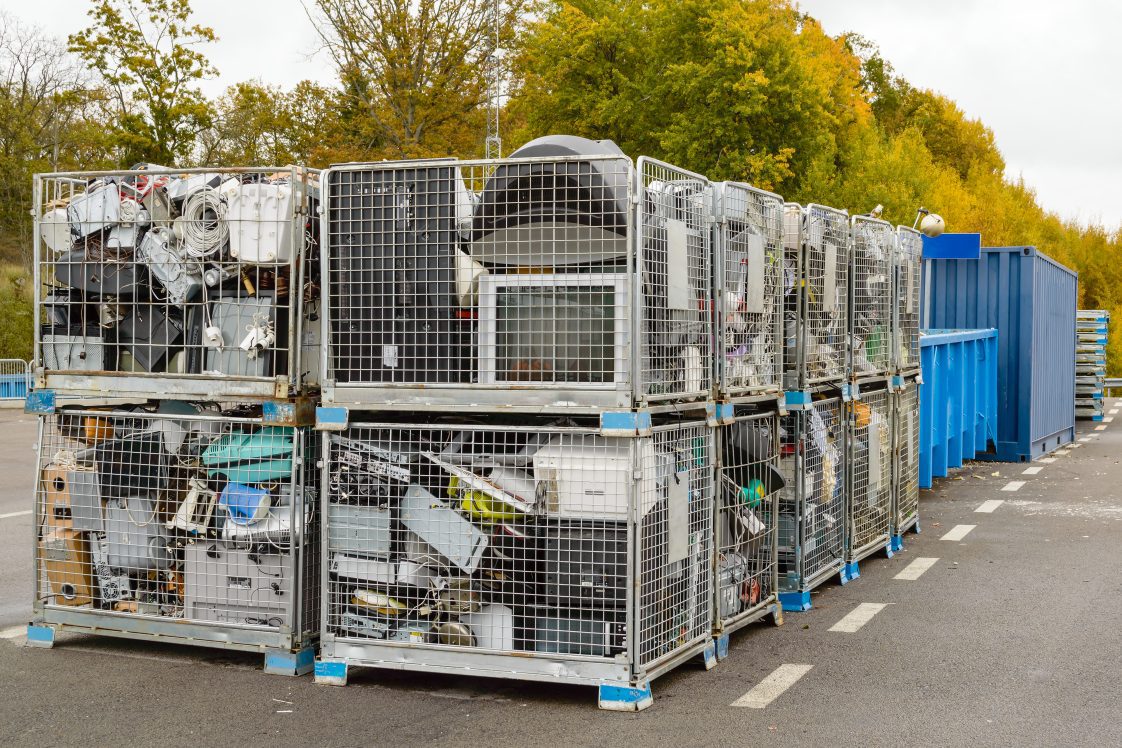Natural Resources

Broken or discarded household and industry electronics used for communication, data processing, or entertainment are known as electronic waste (e-waste). Chemicals found in e-waste are toxic and can seep into the soil at public landfills. Recycling, however, reduces e-waste contamination. Today, e-waste recycling protects natural resources and is easy and widely available.
Why recycle e-waste?
E-waste continues to increase with greater use of digital technology. Recycling e-waste helps to reduce pollution and find other uses for the recycled materials.
In 2019, the United States generated approximately 7.6 million tons of e-waste, according to the Global E-Waste Statistics Partnership. Since only 15 percent of e-waste is collected, there is a need to increase the frequency and intensity of e-waste recycling events. When the public chooses to recycle, these products are collected, processed, and prepped to sell to various markets. Therefore, recycling electronics prevents environmental ruin, reduces waste, and creates local jobs.
Recycling Drives
The Alabama Cooperative Extension System’s urban forestry, wildlife, and natural resources management team has a long history of hosting e-waste and other recycling events. Several recycling drives were coordinated across the state from May through September 2023. The e-waste drives are activities of the E-waste Management Education Program.
May 2023
Barbour County
In early May, Extension Specialist Karnita Garner and Urban Regional Extension Agent Marcus Garner partnered with the Barbour County Homemakers and Allie Logan—former Barbour County Extension coordinator and current assistant director for field operations—to host a recycling event. The activity was held at the Barbour County Extension office in Eufaula, Alabama. According to event partner Interstate Batteries, 39 cars dropped off 3,600 pounds of e-waste. Participants included several small businesses, which contributed tremendously to the significant collection.
Morgan County
Also in May, Urban Regional Extension Agent Allyson Shabel partnered with the Better Business Bureau of North Alabama (BBB) to host the annual BBB Decatur Shred Day. Other partners included NUCOR Decatur, Alpha Kappa Alpha Sorority, BComing Church, and Managed Asset Recycling Solutions (MARS). Approximately 350 households in Morgan County utilized the event to shred 18,000 pounds of sensitive documents and recycle 3,500 pounds of electronic waste. Furthermore, 197 pounds of unused medication was collected and disposed of by the Morgan County Sheriff’s Department.
June 2023
Jefferson County
Urban Regional Extension Agent Bronson Lubresky and the Jefferson County Extension office also partnered with the following to host an e-waste drive and paper shredding event:
- Jefferson County Commission (in partnership with the cites of Bessemer, Birmingham, Leeds, and Mountain Brook)
- Jefferson County Department of Health Watershed Protection Program
- Jefferson County Soil and Water Conservation Foundation
- Keep Birmingham Beautiful
- Nucor Steele, Inc.
- Protec Recycling
- Storm Water Management Authority, Inc.
- Village Creek Society
The recycling drive was held at the Jefferson County Water Reclamation Facility in Birmingham, Alabama. More than 25 staff from the supporting organizations and several volunteers worked to make the event a huge success. Intake forms were obtained from 51 cars representing 53 households, 15 local jurisdictions, and 20 ZIP codes. A total of 2,980 pounds (1.49 tons) of electronics were collected, and 1,700 pounds (0.85 tons) of paper was shredded. Participants received information about Alabama Extension programs, the adverse consequences of nonpoint source pollution, and the steps to report suspected water pollution.
September 2023
Limestone County
In late September, Shabel partnered with the Better Business Bureau of North Alabama (BBB), Keep Athens-Limestone Beautiful (KALB), Alpha Kappa Alpha Sorority, Incorporated, and Athens State University to host the BBB Athens Shred Day. A total of 479 households from across Limestone County participated in the event. Approximately 7,000 pounds of electronic waste were recycled, and 18,000 pounds of sensitive documents were shredded. In addition, 376 pounds of expired and unused medication were collected by the Athens Police Department.
Recycling Impacts
Recycling events yield significant social, environmental, and economic impacts. For example, chemicals found in electronics—such as mercury, lead, cadmium, bromine, and chromium— are toxic and harmful to animals, plants, and humans. Alabama Extension at Alabama A&M University and local partners host recycling events throughout the year. Participants can make significant impacts without leaving the comfort of their cars. Materials such as gold and copper, as well as old equipment, are reclaimed and repurposed by working with local recyclers.
Recycling events held during 2023 provided the following impacts:
- 635 participants
- 17,080 pounds of electronics collected
- 491.11 pounds of toxic metals diverted away from landfills
- 5,768 pounds of total metals conserved
- 573 pounds of pharmaceuticals and personal care products
- 680,126 hours of electricity were saved
- 23,807 pounds of carbon emissions were reduced
- 300 e-waste publications were distributed
- 37,700 pounds of sensitive documents were shredded
- 100 trees were saved through the paper recycling
- 30,184 gallons of water was saved through the paper recycling
*Environmental calculations are based on data from the Montgomery County Department of Environmental Protection and the e-Stewards Global Impact Calculator.
Learn More
Through the International Cooperation Program, the Environmental Protection Agency works to reduce the negative impact of e-waste in the United States and developing nations. In Alabama, residents are encouraged to contact your county Extension office to learn more about best e-waste management practices. You can also visit the Natural Resources page for program and other information or contact Karnita Garner at (256) 372-8331.
Social Media
Environmental information is also available on Alabama Extension’s social media sites. Visit the Alabama Extension at Alabama A&M University on Facebook and the urban forestry, wildlife, and natural resources management team on Instagram.

